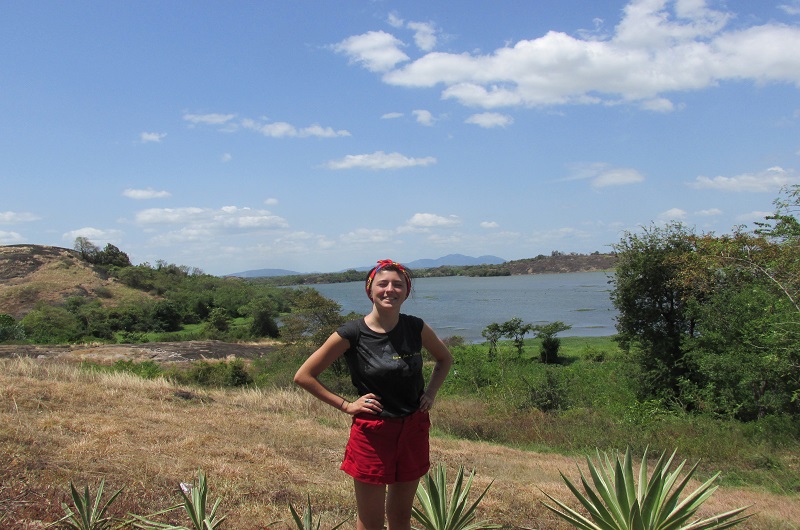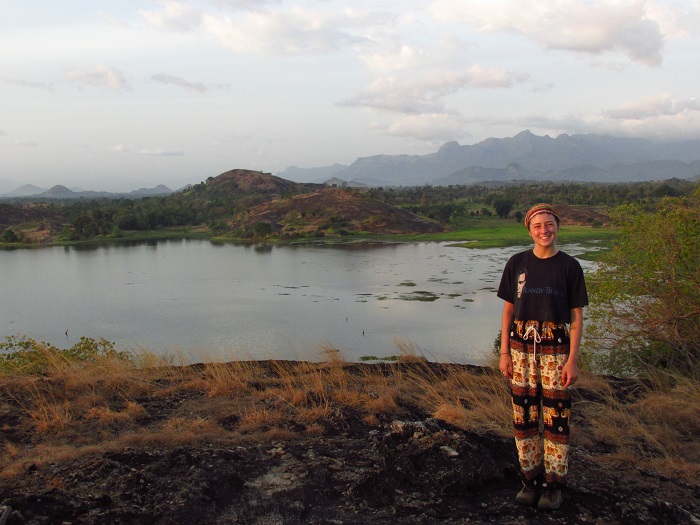Shannon Schroeder is a two-time Greenheart Travel Alumna from DePaul University. She participated in our Thailand Internship program as well as our volunteer abroad program in Sri Lanka, and she even interned at Greenheart Travel’s office in Chicago. Her experiences abroad have deeply shaped her academic career as well as her life goals, and Shannon believes in the transformative power of experiential learning. Below she shares some of her reflections on her recent program in Sri Lanka and how it affected her upon returning back to the US.
What was it like living out in the middle of a national park?
Going into the program, I was nervous about the accommodations. I had never really lived “off-the-grid” like that before, and I am so used to having my smart phone, internet and cable TV. We’re always connected in the US, but in Sri Lanka, you’re kind of in the middle of nowhere. You’re disconnected from those interruptions, and for me, it was a wakeup call. It made me appreciate how life used to be, before all of the modern technologies. You spend your time more wisely without the distraction of technology. Most of my free time was spent reading, enjoying the outdoors, and seeing the Milky Way every night. You are really aware of your surroundings which more deeply enhanced my experience. I was able to connect with my fellow volunteers better, and I was able to create better memories with them.
Did you experience any culture shock?
Yes, definitely. You’re living how the locals live and you are completely immersed in the lifestyle. It’s going to be different, and even though I felt prepared by Greenheart Travel ahead of time, I still didn’t really have an image in my mind of how it would feel to be there. And then you see it, you live it yourself. You realize that there are people out there who have never known what it’s like to have a hot shower or who’ve never eaten pizza, things that in the US come so easily to us. It’s hard because you’re out of your comfort zone and not privileged with the normal amenities you’re used to. And it was a shock at first. But living in that discomfort helped me immerse myself even deeper, and I learned so much more because of it. I couldn’t talk to people about what I would normally talk about like movies or music, but I was able to ask them about the birds they see every day or what their daily routines are like. I was able to life as they were living, which brought us together because I was personally able to relate to their lifestyle.
Can you describe what your average day on the program looked like?
Living out in the rustic conditions of the field house seemed to make a big impact on you. Can you talk about that?
It was great to escape to a more basic lifestyle because people are much more genuine and appreciative of the world and wildlife around them. The limited amenities will help you get so much more out of the experience because you’ll give yourself the space to reflect on why you’re there and the impact that you’re making. The world is a big place and traveling to Sri Lanka helped me realize how different people live their lives around the world, and yet how the same we are. I’m trying to practice a more intentional life now, where I take right action or right speech, which are taught in Buddhism and Buddhist teachings. I want to be in the moment. I want to be there to make a difference.
Why is a program like this important for your professional development? And how has it influenced your career path?
I’ve learned so much more than I did in a classroom setting and it’s been really great for my education & career. I am an environmental studies major in college, so I had studied about the issues facing the community before leaving for the program. But actually being immersed in it, you have a totally different understanding of what the human elephant conflict is. Actually going out into the field and looking at elephant dung (poop) and dissecting it to see what they ate, I got to practice conservation research in action. I recorded the data, documented their movements, and observed their behavior. It’s so much different than reading about the results in an academic research paper. I now know that in-the-field conservation work is a direction I want to take in my career.
Did doing research in the field change your perception of the human elephant conflict?
Now, I feel much more responsible for how the elephant-human conflict will turn out. Before I went on the program, I would read about HEC and feel sad, and think “oh that’s so unfortunate.” But now that I’ve been immersed in it and experienced it, I am more connected and apt to take action on it. I want to be a part of the solution. I’ve connected to it on a personal level, not just an academic level. I find myself talking about my research with other people and getting them educated on the issues facing Sri Lankan communities and the elephant population. I just have a much more holistic and well-rounded understanding than I did before.
Do you have any advice you would give to people planning to enroll in this program?
Has this experience inspired you in other ways?
I’ve always loved cats and animals, but this trip made me I realize just how important their lives are to me. I am committed to making animals’ lives better around the world. It actually inspired me to start my own veterinary initiative. You can learn more about it here.
What are some of the lessons that you learned from living in Sri Lanka?
One of the biggest things I learned is to not take anything for granted. Some of the farmers I met lost everything they owned and worked for in one night when an elephant stormed into their property and destroyed their crops. In a developing country like Sri Lanka, resources are scarcer and infrastructure isn’t as developed, so people can’t just start over. They’ve lost everything. You realize just how much we have in the US and how much we feel entitled to have. I want to better appreciate my surroundings at home and just practice gratefulness.
How do you feel like this program changed you?
It changed me in more ways that I expected it to. I’ve only processed some of these changes and there are definitely some things that I’m still trying to figure out. I have a whole new perspective on everyday life and privilege. Coming back to a big city like Chicago, I am grateful for everything that I have now and have had in the past. I am more appreciative of the ease of everyday life. I am much more aware of how my actions and behaviors affect other people around me. I also feel much more independent than I was before. I am confident in my ability to adjust and adapt to new situations. I can approach people so much better now and I am comfortable talking to people from different backgrounds in a way I wasn’t before.
Are you inspired by Shannon’s story in Sri Lanka? Find out more about how you can get involved below.


Leave a Reply